Egypt: A Cautionary Tale for Cruisers
Kiwi sailors Lane and Kay Finlay recently stopped in Egypt on their way north to the Suez Canal and the Mediterranean. This report on their experiences checking in and out of Port Ghalib provides useful information, and a word of caution, for those following in their wake.
Published 2 years ago
Checking in to Port Ghalib
Your first stop in Egypt when coming from the south should be Port Ghalib. All other anchorages should be avoided. Most are patrolled by the Egyptian Navy / Coast Guard / Police and you will likely be harassed and possibly fined for stopping without first checking in. One yacht we met was threatened with a US$10,000 fine!

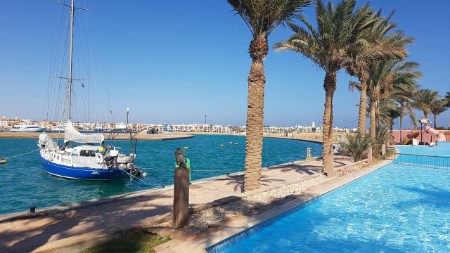
- SV Mai Tai at Port Ghalib.
When you are a week from arriving in Port Ghalib you should contact an agent and send them all necessary documents. You do not need a visa before arriving. You will be able to get a 30 day visa on arrival.
Before Covid, yachts could stop in Port Ghalib just for fuel and not have to clear in. This is no longer an option. Every foreign yacht must clear in when entering Port Ghalib, even if they just need fuel. Once you have entered the country you will be able to buy fuel. However, be aware that it takes five to seven days to clear out of Port Ghalib due to the Coast Guard process of issuing port clearances. These must be issued in Cairo and even the agents have no control over this process. You are a prisoner in the marina, paying daily berth rates, until the Coast Guard decides to let you go.
You must have your vaccination certificate with QR code to enter Egypt. Yellow fever is also required if you have stopped in Sudan prior to your arrival in Egypt.
The Coast Guard or Customs will require you to hand over all weapons, including spear guns. In addition, they also will require you to turn over any drones you may have onboard. Apparently these will be returned to you when you check out but where do you have to collect them from? Probably Hurghada.
An hour or so before entering the Port call Port Control on VHF Channel 10 and request permission to enter. You will be directed to the Customs Dock for clearance procedures. This process usually takes most of the day. Expect to remain on the Customs Dock six or more hours. No one is in any hurry here. Be sure you have strong fenders for the concrete wall you will be tied to.
Quarantine officials will inspect the boat and your vaccination papers. Then, immigration will stamp your passports with your visa. Next, Customs will come on-board and we don’t know what they do as they only spent about 2 minutes inside.
You will now be directed to your marina berth. There is no option to anchor here. You must pay for a berth. The berths are all stern-tie and a port inflatable will assist you to tie the mooring lines. There is water and power available at each berth. The local dive boats told us the water is only for washing, not for drinking. We did drink the water here but it was run through our carbon filter first. We did not use the power.
Check in Costs: January 2022
- Agent: US$150
- Immigration: US$150
- Visas: US$25 / person
- Quarantine: US$40
- Customs: US$30
- Government Marina Tax: US$30 / month for under 15 meters, $50 for over 15 meters (paid to the marina)
- Marina Fees: Check with your agent for current charges. We paid $450/mo off season rate for under 15 meter monohull.
Common Questions:
Sim Cards:
There is a small computer store in the employee village a couple of kilometers walk from the main marina. We paid 300ep for approximately 36 gigabytes of data at this store, far less than we were quoted in the tourist village. The Vodafone sim is probably the best option because it will work in most places all the way through Egypt. The stores down in the tourist area all want to sell you sim cards because they double or triple the price. We stayed away from these stores.
Laundry:
There is a place that does laundry in the same building as Adam Market and the computer store but on the west side of the building.
Diesel:
Diesel and petrol are available at the fuel dock next to the Customs Dock. They do not want to fill jerry cans, only internal fuel tanks. However, our agent was able to get special permission to fill our jerry cans after much discussion. We paid US$1.18 / litre in February, 2022. We didn’t need petrol. Bottom line, if your jerry cans are full, leave them full and top up your main tanks at the fuel dock. We made the mistake of transferring our jerry cans into the main tanks first so we could take them over by dinghy to fill them. Wrong move!

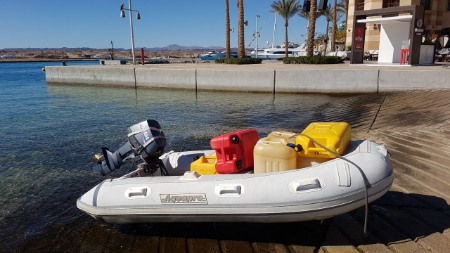
- Filling up jerry cans in Port Ghalib is not usually possible. Fuel must be loaded directly into onboard tanks.
Groceries:
There are three grocery stores in the employee village. They mostly carry the same things but you can get enough food to survive while you are here. Certain days are better than others as all supplies come in from Quseir or Hurghada, usually once each week. The fresh vegetables are not very fresh and will not last long on board. If you need to get a big stock of fresh vegetables that will last, it is worth driving up to the market in Al Quseir. We had to go to Hurghada for visas and found wonderful fresh vegetables there. However, it is a long way if you are just going for veges.
Repairs and Maintenance:
There are no diesel shops or chandlers in Port Ghalib. The local dive boats all go to Quseer or Hurghada for repairs. You can find many marine parts in Hurghada but it is nearly a 3 hour drive each way. We needed a repair to our refrigerator and the nearest technician was in Quseer, an hour away. We waited a few days until he was in Ghalib for another job.
Visa renewal:
Because we did some land travel while the boat was safe in Port Ghalib, we had to extend our visa. In the past, Immigration and Customs allowed a two week window from the time your visa expired to allow you to wait for a weather window to get out of the port with no fines. Sadly, the Egyptian Navy now requires that your visa be within it’s official operating dates before they will grant you permission to leave. In our case, we were one day past our visa expiry date when we applied for our exit permit and it was denied. This forced us to get an extension on our visas, which can only be done in Hurghada, three hours drive away, and at a cost of $108 each. The minimum time to process a visa extension is 10 days from application date so we also missed our next weather window.
Be aware that Egypt is a moving target. Meaning that what you are told may be how things were last week. We found that even our agent was unaware of this change. Although, we later discovered that he was conveniently unaware of many things.
Checking out of Egypt:
Before Covid, cruisers regularly day sailed up the coast of Egypt and checked out in Port Suez. In those days there was a cruising permit you could buy for US$150, which gave you permission to stop at most bays and harbours. According to Captain Heebe (Prince of the Red Sea Agency), you now must check out of Port Ghalib because it has become so much trouble and so expensive to do it in Port Suez.
In addition, Captain Heebe suggests ONLY the following stops in route from Port Ghalib to Port Suez:
- Soma Bay,
- Endeavour Harbour,
- El Tur,
- Ras Abu Zinema,
- Ras Matrma,
- Ras Sudr.
All other ports are now basically off limits to foreign vessels accept in the case of an emergency. The Navy/Coast Guard are spreading military bases along the coast and prohibiting yachts from stopping except in the places mentioned above. This is changing almost weekly. By checking out of Port Ghalib, you eliminate the need for the cruising permit. However, you will not be allowed ashore at any of the anchorages mentioned above.
Checking out of Port Ghalib does not cost any money as you paid for both checking in and checking out when you arrived. However, Coast Guard control the whole coast of Egypt and only they can issue you a permit to exit Port Ghalib. The week it takes to receive this permit means you may miss a perfectly good weather window to move north.
Other Stuff:
The Coast Guard prohibits moving around inside Port Ghalib by boat between the hours of 1800 and 0800. This includes dinghies! Which means if you are berthed on the south side of the harbour (this is where foreign vessels are normally berthed) you will not be able to go in to the main village for dinner or even a drink in the evening unless you walk the four kilometres around the bay – and back, in the dark. Just another control tactic being implemented by the Coast Guard. This is applicable to Egyptians as well, although we occasionally heard outboards go by in the dark.

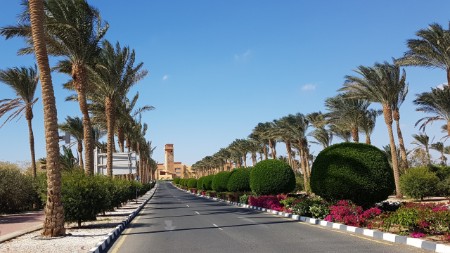
- Empty roads in Port Ghalib.
You cannot get a dive tank filled in Port Ghalib. All the dive tanks are collected each evening from the local commercial dive boats and driven by truck to Quseir, an hour to the north. They are filled during the night and returned the next morning.
If you need LPG you have to buy a full “exchange tank” and transfer the gas to your own tanks. You may be able to send your tank to Quseir for filling, but check with your agent. You will probably need to send your connector with the tank.
Port Ghalib is a dive destination only. Guests fly in, dive for five days and fly out. They are captive at their chosen resort. All food is provided at their hotel. There is nothing here to see except desert and a few flash resorts, which are off limits to cruisers. However, this is a safe place to leave your boat if you want to see a bit of ancient Egypt. You can hire a car and driver in Port Ghalib, as we did, and go to Luxor and the Valley of the Kings. We spent three nights and four days going to Luxor and really enjoyed it. You can also do this on a day trip packed into a big bus leaving at 0400 and returning after dark. Your agent can help you choose. If we had known how difficult it was to leave here, we may not have bothered going.
Why do we recommend that you do NOT stop here?:
There are four problems that are difficult to ignore. First, if you just need fuel, it will be very expensive to check in, pay your agent, pay your marina fee (daily rate is $35 for under 15 meters during low season), pay your visa fees, immigration and customs, etc. That makes the cost of diesel very high, especially if you are just topping up your jerry cans.
Second, Port Ghalib is like a ghost town built by Disney World. All fancy hotels, restaurants and souvenir shops but no real town. This place was built for dive tourism and there are no chandleries, work shops or hardware stores. There are no fresh food markets here and the stores that do sell food are often lacking in fresh supplies. You can see all there is to see in two days – one if you walk fast. So the only reason to enter Port Ghalib is to leave your boat and travel inland.

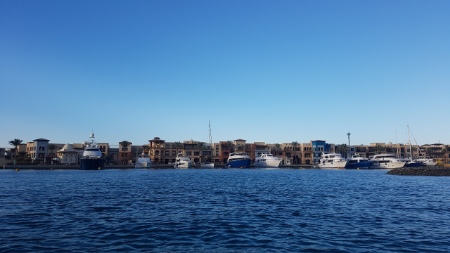
- The only other boats in Port Ghalib are dive charter boats.
“Egyptian Time”
Third, when you want to leave, you need to apply for your exit permit from Coast Guard. This is where you will learn about “Egyptian Time”. It seems that no one is in a hurry to see your wallet leave town and coast guard has complete control of every port and marsa from here to Port Suez. We had to apply for our exit permit twice before we could finally leave.
The first one we applied for finally arrived after the weather window had gone so we opted to wait for the next window. However, we found out that the exit permit is only good for five days and the next weather window was two weeks away. In addition, this delay meant that our initial 30 day visas expired. The only place to extend our visas is in Hurghada, a three hour drive each way. You cannot extend your visas online anymore. OK, so another $108 each for the visa plus travel to and from Hurghada. We did that, but they can no longer just stamp your passport with the extension. You now have to wait 10 days for a new visa identification card, which is issued in Cairo. Also, you have to pick this up in person. This means another round trip to Hurghada. Then we watched the weather patterns and apply for the exit permit again. This time it took seven days to receive it and even though we are already two days into a three day window, we are leaving anyway.
Enough is enough. We will be so glad to be out of Egypt. We hope these comments will be helpful to cruisers following in our wake.
Lane and Kay Finley
SV Mai Tai
………………………………………………………………………………………………………………………………………
About the Authors

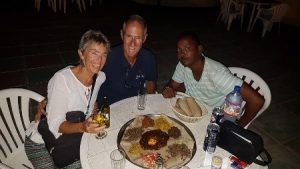
- Kay and Lane in Djibouti with their Agent Ahssan.
Lane and Kay Finley are a couple of kiwis, in their 70s, sailing an old classic cutter around the world. They have been sailing their current boat SV Mai Tai for over 30 years. The boat is an Annapolis 44 or sometimes referred to as a Navy 44 because they were built for the Annapolis Naval Academy in 1962-3. SV Mai Tai is one of six cutters that were built for private owners.
………………………………………………………………………………………………………………………………………
Related Links:
You can read more about Lane and Kay’s experiences in Egypt on their blog: Sailing SV Mai Tai.
………………………………………………………………………………………………………………………………………
Related Reports:
Djibouti: Transiting up the Red Sea
Oman: Updates from Port Salalah
………………………………………………………………………………………………………………………………………
The opinions expressed in this article are the author’s own and do not reflect the view of Noonsite.com or World Cruising Club.
Related to following destinations: Egypt, Port Ghalib, Red Sea (Egypt), Sudan
Related to the following Cruising Resources: Cruising Information, Red Sea, Routing



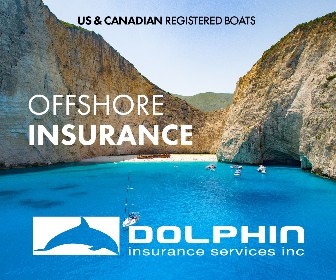

I can confirm the experience with CG and other authorities in this country. It was years ago in Hurghada. After passing through the Suez canal, next stop should be Suakin/Sudan. Try do not pause in between. If you do, It will cost a lot of money.
At the same time I totally agree with the comment below. The Navi was a very positive point in Egypt. Very pleasant and helpful.
Beside this I have to think very hard to pass again through this waters.
Best Regards
Christian
SV/Nabila
Shared with Noonsite by agency Prince of the Red Sea:
A report on a human experience from a single handed Belgian Yacht coming to Suez via Red Sea:
SY Dr NO report:
My crew flew home from Suakin and I continued solo, aiming for Suez. While underway, got ill with abdominal pain and not able to eat. As situation deteriorated, I declared medical emergency by email to MSCHOA and Belgian Maritime Security (who received my daily position reports).
By then I was too weak to pick up my medical kit. Nearest shelter was Port Berenice, 100 nm away or some 16 hours motoring. No-go because naval base.
Within the hour I received permission via MRCC Cairo to enter the naval base.
I arrived the next morning, exhausted would be an understatement.
There was a navy vessel waiting to tow me in. I was greeted with unbelievelable kindness.
A group of no less than 30 soldiers were there to tie up Dr NO to the concrete wall with the greatest care.
There was an ambulance waiting to drive me to the military hospital. I learned later that there was also a plane waiting, to bring me to Cairo in case the local hospital decided they couldn’t help me.
They flew in two high-ranked doctors from Hurghada military hospital to look after me.
General Ahmed, accompanied by 11 officers, came by personally to check how I was doing.
In short, I was treated like a pharao. Anything, anything I said I wanted or needed. I heard that all this was on direct order from the MoD.
My situation improved quickly and 3 days later I was brought back on board Dr NO. During the drive, all gates opened when the driver said “Mister Erik “. I was not surprised anymore to find 2 guards keeping an eye on Dr NO, around the clock.
I was allowed to stay 2 more days to rest and prepare for the next leg.
When I told them I have a good medical insurance, they didn’t want to hear about it and said that it was an honour to help me, and that they hoped to see me back soon in their country, in better circumstances.
My friends I am usually good with words. But I don’t know what to say. Did the Egyptian Navy re-invent hospitality? It seems such a silly understatement.
I can say this: thank you Egyptian Navy. Thank you, Egypt.